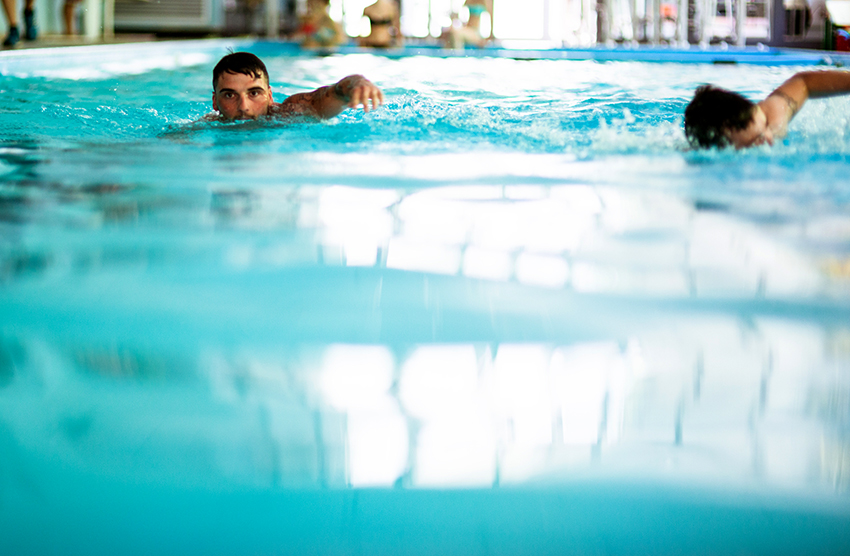Stop swimming in contact lenses (and other things you’re doing to ruin your eye health)

When you think of your physical health, you might think of your heart, lungs, brain, or muscles. While these are all important parts of your body, there’s a crucial part of your overall wellness that you might be forgetting about — your eye health.
Every day, you use your eyes for everything from getting around to watching television to even reading this article. You rely on them significantly, but can they rely on you to keep them healthy?
There are a number of ways you might be harming your eye health without even knowing it. For instance, swimming with contact lenses may be convenient — but it may also lead to serious eye infections.
Every year, roughly 1 million Americans get an eye infection that requires a trip to a healthcare provider — many of which are related to contact lenses.
Unfortunately, seemingly minor actions like this can also cause other problems — like injuries, eye diseases, and vision loss. Here are 3 things to stop doing to protect your eye health now and for years to come.
1. Swimming in contact lenses
Swimming is a great way to stay active and have fun. But while you lather on the sunscreen, put on your swimming suit, and get ready for that refreshing dip, don’t forget an important step — taking out your contact lenses.
According to Anthony Antonello, MD, Ophthalmologist, “Swimming in contact lenses may seem harmless, but it can lead to some serious problems, starting with infections. Even though both public and private swimming pools usually have disinfection systems, bacteria still remain in the water, which can stick to contact lenses and cause eye infections. What’s more, the chemicals in the water can actually lead to outbreaks — not to mention irritation in the eyes."
As for rivers, lakes, oceans, and even the tap water that comes out of your showers and sinks, there is no disinfection system to prevent bacteria at all.
Of course, this doesn’t mean you can’t swim. In order to protect your eyes, remember to:
- Remove your contact lenses before swimming, showering, or getting in a hot tub.
- If you can’t remove your contact lenses, wear airtight goggles in the water.
- Replace your contact lenses if they do become exposed to water.
2. Overusing your eyes
From the moment you wake up to the moment your head hits the pillow, your eyes are hard at work. If you’re like most people, you spend a lot of that time using them to look at all kinds of screens, from phones to computers to televisions.
Amidst it all, your eyes are begging you for one thing — rest.
Spending a lot of time focusing on one thing, like a screen, can fatigue your eyes. Over time, this can lead to eye discomfort, headaches, and vision problems.
"Fortunately, there’s an easy way to prevent overusing your eyes. It’s called the 20-20-20 rule. Every 20 minutes, look at something that’s roughly 20 feet away for 20 seconds. This will give your eyes some much-needed relief from the strain of focusing on objects that are close up," says Dr. Antonello.
3. Exposing your eyes to harm
Just like you put sunscreen on to protect your skin, you should be doing everything in your power to protect your eyes from harm.
One major culprit of eye damage is the sun. UV radiation can damage many parts of your eyes, including surface tissues, the cornea (the clear part of the eye that covers the iris and pupil), and the lens (the clear part of the eye behind the iris). It can also lead to eye conditions, like cataracts (when the lens of the eye becomes cloudy), eye cancer, and growths on your eyes.
The solution? Sunglasses. Find shades that block 99 to 100 percent of both UVA and UVB rays, and wear them to protect your eyes (even on cloudy days).
Another common cause of eye damage is certain activities, such as doing construction work, working on home repairs, or playing sports. Protect your eyes from injury during these activities by wearing protective eyewear, such as safety glasses or goggles.
Eye health starts with you — and continues with your healthcare provider
Taking measures to prevent damage to your eyes on a daily basis is crucial. Just as important, however, is making sure you stay up-to-date on eye exams.
Even if you think your eyes are completely healthy, the only way to be sure is to visit an eye care professional like an ophthalmologist. Many common eye conditions have no warning signs, and the only way to find them in early stages is with an eye exam. An ophthalmologist can also review your family’s eye health history to help determine if you have a higher risk of developing certain eye conditions. Finally, they can talk to you about other ways to promote your eye health, like not smoking and maintaining a healthy weight.
What’s more, getting your annual eye exam can help reveal other health problems, like high blood pressure, diabetes, and thyroid disorder.
Taking care of your body always starts with you. However, with the right resources and trained eye care professionals, you can take your eye health to the next level to ensure a healthier — and clearer — future.
Main Line Health ophthalmologists offer comprehensive, personalized care so that you can enjoy better vision. We can help you find the solution to your vision problems. To schedule an appointment with a specialist at Main Line Health, call 1.866.CALL.MLH (1.866.225.5654).
 Content you want, delivered to your inbox
Content you want, delivered to your inbox
Want to get the latest health and wellness articles delivered right to your inbox?
Subscribe to the Well Ahead Newsletter.
